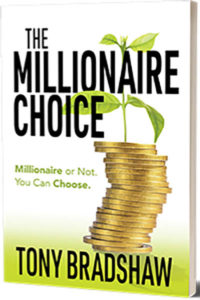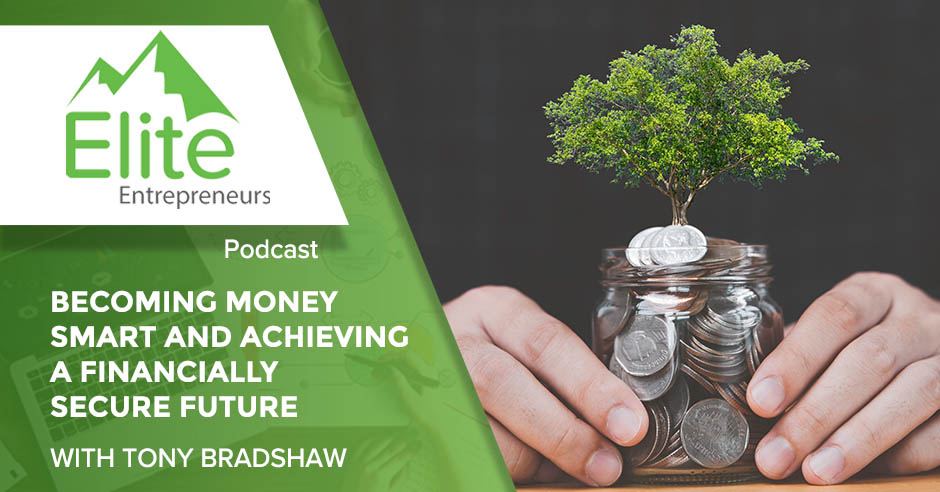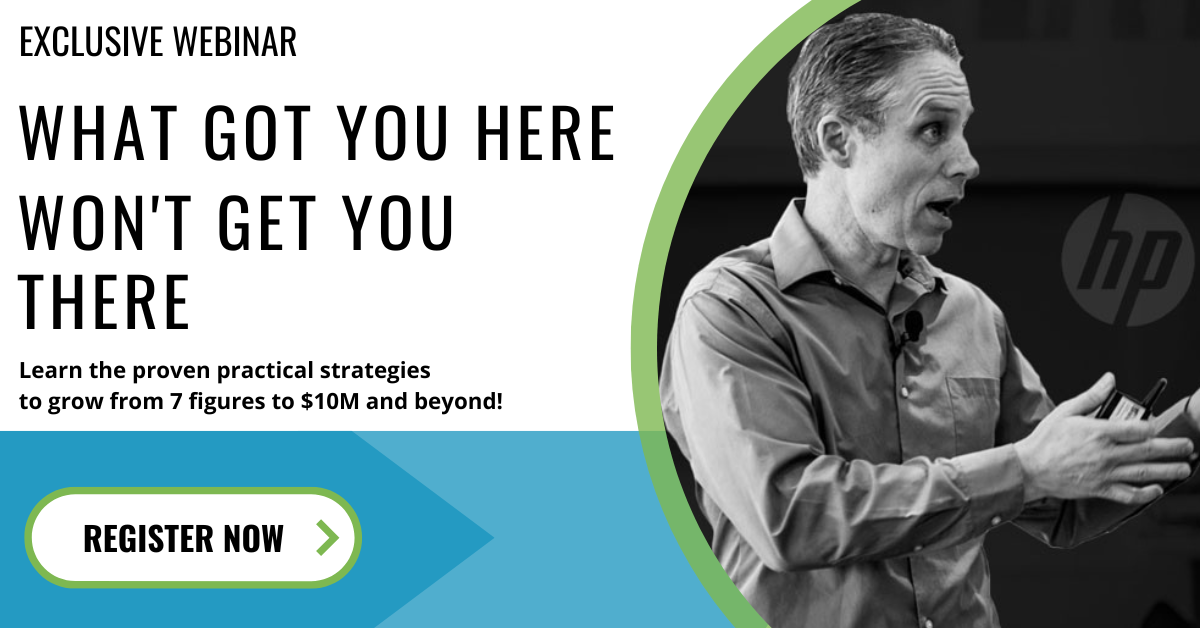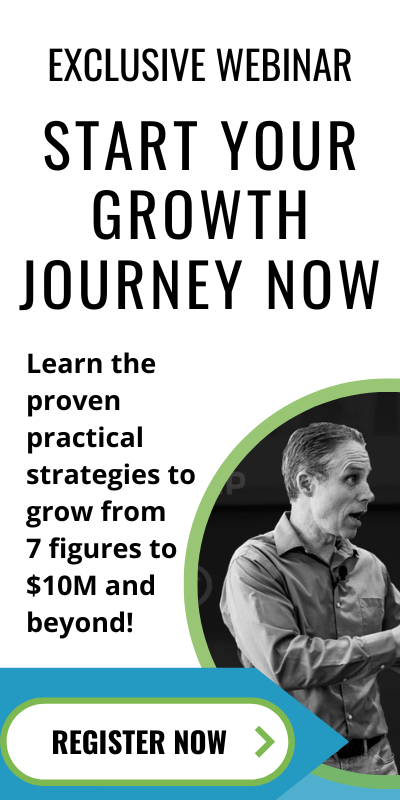Episode 132: Becoming Money Smart And Achieving A Financially Secure Future With Tony Bradshaw
Watch the episode here
Listen to the podcast here
Humans tend to spend money thinking they will never run out of it. Without becoming money smart, you are only trapping yourself to live paycheck to paycheck. This lifestyle gives you little to no chance of achieving a financially secure future. Brett Gilliland sits down with Tony Bradshaw, Author of The Millionaire Choice, to discuss how to reprogram your brain when it comes to managing, saving, and spending cash. He breaks down his Millionaire Plan, which teaches people to prepare for rainy days and look at life through a lens of preparation. Tony also explains why he thinks a person’s minimum net worth is at least $100 million, how to widen your financial knowledge just by going online, and why building wealth is key to doing good in the world.
—
As always, I’ve got a great guest with me. His name is Tony Bradshaw. He’s the author of a book called The Millionaire Choice, and he’s also the host of a podcast by that name, which I love, The Millionaire Choice. We’ll get into that a little bit more. Tony has an extensive background in the world of personal finance, helping people make The Millionaire Choice, including a plan that he works with people to figure out how they’re going to plan to be a millionaire. We’ll get into all that. I love bringing guests in but I want to share a little bit of personal here.
I love bringing guests who can relate to my crazy world. Tony is married and has six children. His bio says he likes to relax in his backyard with the chickens, which I love. Tony, welcome to the show. Not many people who are crazy like me with all these kids and trying to run a business but here you are, and we appreciate you being here.
Thanks for having me on. I’m enjoying talking to you.
Tell us a little bit more about The Millionaire Choice and how you came to write the book. What you’re passionate about? We’ll get into talking about how your expertise can conserve our seven-figure audience.
I grew up in a broken home. I have memories of my parents mismanaging their money. They came from broken homes too, as far as families broken like single-parent homes. They didn’t have mentors in their life or anybody to teach them how to manage money. Small wonder, they became married at the age of about nineteen. I was born when they were a year married at age twenty. My dad was in Vietnam, a young soldier, trying to figure out life. That’s what a lot of us do. We get married, and we’re overwhelmed like, “What is this thing? I’ve got a ring around my finger but I don’t know what I’m doing.”
That was where my parents found themselves. Lots of bounce checks, lots of power getting cut off, and lots of water getting cut off. Utilities are not being paid, and all those stories. They weren’t low income but they were lower income, so not middle income and mismanaged is what we did have. I mirrored those principles when I became an adult, and at 25 years old, I had gotten out of college. My parents had helped me fund my college degree, so fortunately, I didn’t have any student loan debt.
At 25, I got my first W-2 and realized I had made $39,000, the most money I’d ever seen in my life, probably about seven times more than I’d ever made before. I was shocked. I’m like, “Wow.” I’ve got $500 in my bank account and roughly $16,000 in debt. I’m living at home with my mom and dad paying $200 a month in rent and board. I offered to pay him $400 but they turned me down. They said, “No. $200 is enough.”
I had a good deal. I had a great living arrangement but somehow spent $16,000 more than what I made even with very little expenses. I’m like, “There’s something wrong with his picture.” Fortunately, I woke up at that point and then decided I had to make a change. I’m a very change-driven type of person. I started learning about money. Back then, there was no internet at that time, or not much of an internet. It was like AOL America Online. You’d get on here.
I would drive out to the bookstore and pick up books and magazines, which is what I did as a kid. I’d learned to read and learned everything I could about money. In a very short period, I realized that money’s not that complicated. If you do the right things, you can end up in some very positive places. I put together what I call My Millionaire Plan. I had learned how to use a spreadsheet, and so I played with the numbers a little bit and figured out I could be a millionaire by age 40 based on a $39,000-a-year income.
Imagine that you’re making $39,000 a year and thinking you could be a millionaire, but that was where I started. Now that being said, we were making jokes earlier but I did not plan on getting married. I was debt-free when I married, but my wife had $20,000 in debt, so I started paying off her debt. While I was engaged against some of the people advising me not to do that. I decided to do it anyway. Six kids later, you find out that you have to pay about $1,500 in diapers per kid. That’s another $9,000.
You’ve done the math. I try to avoid that math like, “I don’t want to know how much this has cost.”
I tried to get my wife to do cloth diapers but fortunately, she said no. My boss told me it was a bad idea, so he hadn’t done cloth diapers. He spoke from experience. I’m like, “We’ll write the check for the diapers.” On that journey, I realized that debt was not my friend. At least consumer debt’s not. I started paying off all my debt as fast as I could. I started investing at the same time.
I was doing a little bit there that we can talk about. I realized money’s not that complicated. You have to make a few better choices. Learn a little bit, take some time to learn something, and then you can end up in a very different place than necessarily where you were born or where you’re at. You can make a difference. Reshape your future.
Money is not that complicated. You just have to make a few better choices, take some time to learn, and you will end up in a very different place and reshape your future. Share on XI love that introduction and background to who you are. Thank you for sharing some of that personal background. Be generalized and say there’s a business owner out there who’s figured out how to get a business off the ground. They get to seven figures. There’s revenue coming in, seven figures in revenue for the business, not seven figures in income for the business owner. There’s a distinction. Maybe for the first time in a while, the business owner’s feeling like, “I’m making some money. I’m bringing home some money.” Whether it’s $100,000, $200,000 or $39,000 in your case back then, we can all spend more than what we’re bringing in.
That puts us in a world of hurt. It can take us in the wrong direction when it comes to the future of our financial health. What are some things that you would recommend or some simple principles? We’re not going to uncover the whole book that you wrote here but what are a few things to keep in mind for these business owners who might have some income coming in that would enable them to build a much better picture in the future than if they lived the way they’ve always lived?
For business owners, because you’re obviously doing something right, no matter who you are, as long as you’ve got a business that’s cashflowing. The two big principles that come to number one, I’m going to say, is to keep your expenses low. The world is full of people who made a lot of money but did not adapt to that money. They either came from lower humble beginnings or lower incomes and never changed their financial principles. They didn’t know how to handle their money, so their expenses in their life grew along with their income. It didn’t matter if they were making $30,000 or $3 million a year. They allowed their expenses to match where their income level.

Money Smart: The world is full of people who make a lot of money but do not know how to adapt to it. They allow their expenses to grow along with their income.
The problem with that, and this is the second principle, is that some people call it a rainy-day fund. I call it, “No one ever expects the party to end.” When things are going well, we have a human nature to imagine that things are going to continue to go well indefinitely. If you have a job, you expect your job to be there. If you have a job that pays you seven figures, you mentally think that seven-figure job is always going to be there.
The reality is that you may lose your health or your marriage. There are all these different things that can happen, and I’m not saying run your life based on fear but you have to look at your life through a lens of preparation. Imagine that, and a great example would be COVID. No one expected the entire economy of the world to shut down. It shouldn’t have, by the way, personal opinion, but people did it to shut down, and that affected a lot of businesses.
I saw a number that 60% or 70% of all businesses that closed down during COVID never reopened like small businesses. That’s your bars, your restaurants, and things people put their entire lives into to build it to be moderately successful, and all of a sudden, it’s gone. You’ve got to think about your life in such a way that you can pivot. Prepare for those days when you may need to pivot. Those are the big things.
If you’re making $150,000, $200,000 or $300,000 a year, get yourself in a position where what would happen if it all went away? What if your business went away? You live those days where you’re preparing, not necessarily for the worst but in a smart way because it can’t happen. A story a little while ago, the house I bought down in Columbia. It’s about 45 minutes South of where I live.
The guy that owned it was a man and his wife, and he was a surgeon. You can imagine how much he made as a surgeon, $300,000, $400,000 or $500,000 a year. He was at a friend’s party one night with his wife, and the second-floor deck of the party house that he was and collapsed. He broke his spine. He went to a party to have a good night, fell off of a 2-story balcony or a 2-story deck, broke his back, and never went back to work.
His wife ends up leaving him, and he’s alone. We ended up buying this house because he had some medical issues. He needed the money from that house. That’s not something you could plan for. You don’t expect that to happen. You don’t want to walk around in fear but you can still prepare for it. As you prepare for things like that, you’re going to be better off. It may not be that thing. It may not be that dramatic but keep your expenses low.
A third one that’s important for me is that I’m not a big-budgeter. I don’t like budgeting all the time. What I believe in is getting your cash to flow in the right direction. For most Americans, even business owners, I would say this is true. Your money tends to flow away from you. You go, work, and earn it through your business but then once you get it, where’s it flowing? Is it flowing into things like a swimming pool, a new car, a trip or a boat? Where is it? That’s like sand going through your fingers.
If you can get your money flowing in a direction that returns value back to you, into investments is what I’m talking about but into a flow. What happens is you rewire your brain. When you get a new dollar, you’re going, “Where can I put this that gives me a return?” You get an extra $10,000. Maybe you’ve got a good month. Some people might say, “I’ve had a great month. We made a $100,000 this month. Let me go celebrate.” Maybe that celebration’s a little too big. What would happen if you were to be able to put that into something that returns to you? If you’re a young entrepreneur, you’ve got more of time on your side.
If you’re an older entrepreneur, you don’t have as much time to multiply it. Those are what I’d say are the big three for me. Most Americans are not walking around with a vision for their finances. They don’t. That’s why over 70% of people are living paycheck to paycheck. A lot of businesses are struggling. They don’t necessarily have a vision. They might have a product or some work that they do but they don’t have a vision of what they want the future to look like. How can they shape the future?
Most Americans do not have a vision for their finances. Over 70% of people are living paycheck to paycheck, and a lot of businesses are struggling. Share on XThose are great tips. I’m amazed at how quickly that we, as people, will find ourselves in a place where we get complacent about money. “As long as there’s enough, I’m not going to worry about it.” We keep spending or upping that lifestyle to go with the income like you mentioned, and then something turns south or there’s an unexpected expense, or there’s something as catastrophic as the story you told with the surgeon where literally life changed for the rest of his life.
His ability to bring in funds dramatically altered, and now the game looks a lot different. Without being paranoid, how do we be conscientious about setting aside for a rainy day or having money multiply for us instead of spending it as we get it? It’s great stuff. Let’s talk for a minute about how to break the cycle. You talked about your parents growing up, not understanding how to think about money. You were taught that way and able to break the cycle. You went and read things.
If we have anybody who’s reading who has families or comes from a history of families who don’t have the right relationship with money, how would you recommend they begin to change the way they view it? They can go pick up The Millionaire Choice, which is going to be a great read for them. Is that the only thing you would recommend? Do they listen to your podcast? Do they listen to some other things? Where would you point people who need some reprogramming about money?
I like to believe I wrote a good book but it’s not that good. It’s going to get you moving in the right direction but it’s not going to fix all your problems with money. I would tell you the biggest principle there and the way I teach it. You got to get money smart. Like you spent twelve years of your life going through kindergarten through 12th grade, 13 years there. Learning about Math, English, Science, and a lot of other subjects, you put a lot of effort into your education together.
If you go off to college as I did, you got another four years where I study Engineering. Maybe you get your Master’s degree, and it’s another year. You get your Doctorate. It’s another two years. You can put a lot into your education but along those lines, there’s not a good structure in place. Even if there is some structure, it’s not adequate.
Even for schools that are teaching financial literacy, it’s not adequate. It’s underserved. When you think about money, how much should you study money? It’s affecting your entire life. The average person is going to work between 100,000 and 150,000 hours in their lifetime. That is a lot of time. When you think of it, you get to the end, you’re like, “I’m 65, I got a house and maybe a car that I got a car note on. Maybe I got some student loan debt or maybe I got some consumer debt.” What do you have for that much time? The way the world is set up, the way our financial system’s set up, it is a medium of exchange, and we are going to work or earn money and trade our time, our lives for capital or cash.
There’s a whole system there that collects all of that capital and cash called taxes and interest. When you look at what you pay out, those two things gobble up probably 75% of your lifetime earnings by the time you play that out for average America. Not for people who learn how to build wealth but for the average person. It’s sad when you look at it.
What do you change? You have to learn the work within the system, and that’s why I talk about getting money smart. I look at financial education as something that everybody should be doing on an ongoing basis for their entire life. You should be doing something new and learning something new about money every year of your life for your entire life. That’s how you master money.
The other principle, you can do that through a book, a podcast, and local groups. We have a real estate investors group here in Nashville. I’ve been to a few times. I need to go more because I’m learning about how to invest in real estate better. I’m becoming a better real estate investor. I probably own six different properties in my lifetime so far.
If I had learned real estate properly, I probably should own twenty by now but I’ve only owned about 6, and currently, I only own 2, so I’m making maybe $2 million or $3 million if you include the house I’m currently living in. I’m learning to master real estate. I’m not a master of real estate. I did pretty well in the corporate world, so I learned how to invest in myself as a person and grow my skills. That’s where I made a lot of my money. That principle of Get Money Smart, it’s Millionaire Key number three in my book.
That is probably one of the biggest things I could recommend anybody do. On the heels of that one, Millionaire Key number four would be to find a Money Mentor. I’m a do-it-yourself guy, so on my financial journey, I pretty much use books and resources to grow myself but I’ve met people now because we have so many more resources at our fingertips.
You can learn about money sitting at your computer watching YouTube videos. That didn’t exist for me. If you do that, you can get into community groups or wealth-building groups and learn from other people. I’m a big believer that you’re going to learn a lot more, a lot faster, by connecting with the right people than any number of books that you can go pick up.

Money Smart: You can learn about money by watching YouTube videos or joining wealth-building groups to learn with others.
You should do both but you’ve got to develop a mindset of building wealth and learn how to multiply it. The danger for a business owner like your audience, the Elite Entrepreneurs group, is that as business owners, we become so hyperfocus on our business that we don’t add these other skillsets to our knowledge base.
We’re so focused on growing the business that we don’t take the time to learn about money on the side. “How can I make some money in real estate over here? How can I make some money in some stocks? Should I invest in crypto or not? How do I answer that question?” Go find somebody and talk to them. Should you buy silver? Silver is a great investment now.
Those are the principles of what you got to do. The pitfalls of being a business owner are that you can become so hyperfocus and stretched so thin. By the time you deal with your marriage, and your family, and then you throw the business needs on top of that, what do you have left to go? You’ve got to figure out how to put that in your routine. That’s a big deal.
It is almost like to build a routine that promotes. You don’t even have to think about it. It’s second nature to you. A great example would be getting on a treadmill. Everybody needs to exercise. What are you listening to while you exercise? Are you listening to music? What are you absorbing with nowadays materials? That’s a big one.
I’ve been sloppy, honestly. I’ll be confessing. I was a terrible exerciser in my late 30s and mid-40s. I hit 50, and I’m like, “I need to straighten this up a little bit. I need to get on track with some of this.” I’m reprogramming myself and creating new routines that make those habits easier to put in place and make my time more productive for me as an entrepreneur, a man, a husband, and all those things. Find the best way to leverage your time.
You’re right that money is a language. If any of us wants to master a second language, there’s a lot of time and energy, and you got to immerse yourself in it. You can’t just do a couple of sessions of Duolingo and pretend that now, “I know how to speak Spanish, Chinese or whatever.” I’m not saying money is a completely foreign language.
It’s a different way of thinking, conversing, investing, and all those things. We don’t spend nearly enough time talking or thinking about it. You’re one of those self-profess do-it-yourself guys. I fit in that camp as well. A lot of business owners fit in that camp of, “I’m going to figure this out.” For those of us who want to take steps towards getting some help from somebody like a personal trainer in our fitness life, I know there are lots of financial planners and wealth managers out there. Where would one start to find mentors or somebody that might be a partner for them in their money-maturing journey?
I love the way you asked that question and the way you stated it because I believe everybody’s at a different level. The first thing that came to mind was that you need to set a financial vision for yourself for the future. What came to me as you were talking, Brett was that if you’re a business owner, you probably need to set a minimum. I’m going to say a minimum net worth goal of at least $10 million. That’s my personal opinion. The reason I set that number is that if you had $1 million this 2023, the rate of inflation, the government says it’s about 9%, which is a lie. It’s probably closer to 20% to 30%.
If you had $1 million, you now have, congratulations, $800,000 or $700,000 in value, actual cash purchasing value. If you had $10 million at the beginning of 2023, you would be sitting on about $7 million to $8 million in actual purchasing power or value. You need to set some pretty lofty goals as a business owner and then figure out how to hit those goals.
The answer to your question. Let me throw one more stat at you, too. In the United States, 40% of the world’s millionaires live in the United States. That number may be a few different percentages off right now with everything that’s going on in the world but close to 40%. It’s 300,000, what they call ultra-high net worth individuals. That means people with a net worth over $25 million, so only 300,000.
That’s out of 330 million people in the United States. Those are some numbers for your readers to go, “Where do I want to be?” You could look at that number and go, “That’s a lot of people. Three hundred thousand people have a $25 million net worth.” I know several of those people, at least maybe half a dozen of those people now. Some that are even higher than that. It might be more like twelve.
As a business owner, you should set some pretty lofty goals and go, “I need to set a $10 million net worth goal somewhere out there in the future.” There are a couple of reasons for that. Some of your readers may go, “We don’t want to chase money. We’re chasing life satisfaction.” No, it’s about principles. You put principles in place that take you to where you want to go. I’m a big believer that the more money you have, the more good you can do in the world.
There’s no shortage of people that need help. There are 147 million orphans on the planet. I saw that 900 million people are going in the world and 893 million are going hungry, not getting enough food, not getting enough nutrition. That’s a big problem. My wife has got a book coming out on human trafficking. As she was writing that book, we learned that there are 40 million people that are being human trafficked across the planet. Four million of those people are being sex trafficked, and 99% of those are women that are being sex trafficked. Those are huge problems.
The more money you have, the more good you can do in the world. There's no shortage of people that need help. Share on XThe more money you have, and the more money that good people have, the more we can address those problems in society. Now, I’m a big believer that there shouldn’t be a single hungry person on this planet. The United States alone could feed everybody on the planet. We have the production capacity of the production. There’s not an overpopulation problem as some people might have you believe. It doesn’t exist. There’s plenty to go around but the problem is that the people who have the money, the real money, don’t want to solve that problem. With what you were originally saying, you got to reprogram your mind. We talked about getting money smart.
Where would they reach out for help? If they wanted a personal money trainer, how does that work?
Stay away from financial advisors. The average financial advisor does not have a high net worth and is very one-dimensional. If you’re using a financial advisor now, this is not financial advice. It’s just wisdom. They are instructed to handle your finances in a very specific way. That way is usually very one-dimensional. You want to look at all of the different opportunities that you have to build wealth.

Money Smart: Stay away from financial advisors. The average one does not have a high net worth and is very one-dimensional.
One of those is you’ve got to look in your local area. There are groups that meet about building wealth all over the place. I would visit quite a few of those. Who you start with now is not necessarily who you have to be with, say, in five years. The concept is to get going with somebody, and that’s going to open another door to somebody else.
You’re going to keep upgrading who your mentor is along the way but there are online groups. I’ll give you an example of WallStreetBets when GameStop is going down. It was an online community on the Reddit forums called WallStreetBets. That’s what I would call crowdsourced investing knowledge or getting on there and learning. I had a friend who never made an investment before in his life.
He got into the WallStreetBets group. He might have been in a different group but it was a similar group, and he listened. He got in there, didn’t know anything about investing, and listened to them. He ended up getting in on GameStop, made 600% on his GameStop investment, and then took that money and put it into something else. I don’t remember what and then turned that into another investment. In one year, he was able to get about 1,200 returns on his investment as a first-year ever investor.
Tell him to quit.
That’s better than I’ve done. I’ve never done that. Now I have had investment turn me into 1,000% or 2,000% but I don’t do those every single day. He got into a group and learned from the group. It’s a group mindset. I’m not saying all those groups are going to be good, so you still have to use your own discernment. A way you can do it is to go, “I want to go plug in a group.” I mentioned a real estate group here in Nashville. It’s called the Real Estate Investors Group or something. I forget the name of it but I’ve only been to that group 2 or 3 times.
There are probably about 30 different investors in there. Usually, they’re going to have a speaker that comes in that you can connect to. There are business coaches that you can hire. Getting into that group most people are probably going to have to get into some group setting to get access to the powerful guys. You’re not going to usually be able to get somebody that’s at an ultra-high net worth level to get access to them.
One specific guy that I would highly recommend is a guy named Jerremy Newsome. He was on my podcast. He made his first investment when he was six years old, and so they have what’s called a trading room. He’s not the only one that does this. These savvy investors will create trading rooms, and you’ll pay a monthly subscription cost to be in their groups. You’ll be able to get on there and watch them trade.
You dial in on a Zoom, and they’ll share their screens. You can see everything they do, and they’ll talk through it with you. You can learn how to options trade or whatever type of trading is going on. You’re doing that. You’re mirroring their processes. You’re learning what they’re doing, and they become a form of mentor for you. That’s a great investment.
A lot of these guys are charging anywhere from $100 a month up to $500 a month to be in those trading groups. You don’t necessarily have to be in there for a year, so don’t think of it as spending twelve months but you could think of it as saying, “I need to try one of these out. Let’s see if I can make some of this stuff work.” You’re going to grow a lot faster that way than if you try to figure it out by buying a bunch of books. You’re going to make a lot fewer mistakes that way because you’ve got somebody that you can ask questions. You can watch and see what they do.
They’re seasoned investors. I believe Jerremy’s net worth is over $25 million. He’s got his own island or is part owner of an island in the British Virgin Islands. You could stay on his island if you want to. He does conferences down there. He’s a cool guy. There’s another lady I had on my show. She worked on Wall Street for a number of years. Her website’s called Simple Trader Pro. She’s an African-American woman who’s teaching people how to invest. There are a lot of these people out there. You just have to vet them.
I have a tool on my website called the Wealth Builders Toolbox, and it’s a list of resources that I’ve put together for people that want to connect. I find people that I’ve had on my own podcast. If I like them a lot and what they offer is highly valuable, then I’ll add them to my listing. There’s Mark Padolsky, who teaches people how to invest in land and flip land. He’s a cool guy. He becomes a land investor. He’s an expert with twenty years of expertise in land investing, buying and selling lots, reselling lots, and marketing them up.
Jerremy, who I mentioned, and a guy named Zack Boothe, who is a real estate refer. He goes and finds properties and then connects those to investors. He’ll find deals for investors. The investors are busy but he’ll connect the property and say, “This will be a good property for you.” He’ll get a fee, which might be $30,000 or something. He’s not even an agent, and he’s teaching people how to make those connections between investment opportunities and investors. He’ll make a good chunk of money off of that. He’s a cool guy but his stuff’s there. It’s called the Wealth Builders Toolbox at TheMillionaireChoice.com. It’s a list of resources for people.
You’ve got a lot of resources that you’ve compiled there. Let’s talk about that website one more time. TheMillionaireChoice.com is the website, and then you call it the Wealth Builder Toolbox.
It’s a newer resource but I’m constantly adding new stuff in there. There’s a reading list. I’m a big believer that if you could read twelve books, read a book a month on finance for one year, you’re going to totally transform the way you think about money at the end of twelve years. That goes back to that routine I mentioned.
If you can find a routine that you can consistently do over time, that’s how you create sustainable growth. That’s one of those where you go, “I’m going to read a book a month, so about 4 to 5 hours a month, I’m going to read a book.” At the end of the year, if you, say, 5 hours a day, you do 60 hours’ worth of reading over a year. You’re a totally different financial thinker after a year. That’s a small commitment.
If you can find a routine that you can consistently do over a period of time, you can create sustainable growth. Share on XFor those who want to make a difference in their life, that seems like a very small commitment, especially when you think about the amount of time that we waste on social media, Netflix, whatever. I’m not saying all entertainment is bad but the point is, we could grow some that’ll have ongoing benefit in our life, real leverage or we could spend the time on brain-numbing types of things. Tony, you’ve been great. You wrote a book called The Millionaire Choice. You have a podcast by that name, The Millionaire Choice Podcast, and I assume they can hear that on all the platforms.
Get it on Spotify, Apple, and any pretty much anywhere.
TheMillionaireChoice.com is the website where they can also find the Wealth Builders Toolbox there. If somebody wants to connect with you, do they go to the website or is there a social media platform that you prefer? How do people connect with you, Tony?
One thing I do that I love doing is I set aside one hour of my day on my calendar to talk to anybody that wants to talk to me, whether that’s about business or about personal finance. People can register for that through my calendar app, TheMillionaireChoice.com. It’ll say Free Life and Money Mentor Session. Go there, and check it out.
I’m also available at TonyBradshaw.com for some other things that are separate from The Millionaire Choice brand overall. Those are the two best ways to reach out and get in contact with me. I love doing the one-hour calls because I get to talk to a lot of people that would not otherwise talk to a financial advisor or a financial mentor. I can at least get them headed in the right direction.
You shared lots of great insights with us. Everybody on the planet needs to upgrade their relationship with money. It’s a concept thing. As we try to help businesses scale, they get to a certain point. Let’s say they get to seven figures. There are new things to figure out to go to $3 million, and once they hit $3 million, there are new things to figure out to get to $10 million. It’s that way with our money.
Every next level of money, earnings, and wealth that I reach, there are new things for me to learn, whether that’s around taxes or investment vehicles, ways to think differently about expenses or what activities I should do myself versus hiring out. There are lots of things to learn, and we got to keep leveling up. Thank you again, Tony, for all of your great insights and for sharing The Millionaire Choice with the world. It’s awesome.
Thanks for having me, Brett.
For everybody reading, please keep reading. We are going to keep bringing you guests like Tony and others who have a lot of information that is completely relevant to you in your seven-figure growth journey and your life. Please share, like, rate, and review all those things. Keep coming back. We will see you next time at the show.
Important Links
- The Millionaire Choice
- The Millionaire Choice
- WallStreetBets
- Jerremy Newsome – The Millionaire Choice Past Episode
- Simple Trader Pro
- Wealth Builders Toolbox
- Mark Padolsky – The Millionaire Choice Podcast Past Episode
- Zack Boothe – The Millionaire Choice Podcast Past Episode
- Spotify – The Millionaire Choice Podcast
- Apple – The Millionaire Choice Podcast
- TonyBradshaw.com
About Tony Bradshaw
 Author and host of The Millionaire Choice Podcast, Tony shows people how to make the millionaire choice and create their own millionaire plan. Founder of the Purpose of Wealth Event, he’s a big believer that wealth has a purpose and that’s to enjoy life and help others in need. Anyone can become a millionaire, why not you?
Author and host of The Millionaire Choice Podcast, Tony shows people how to make the millionaire choice and create their own millionaire plan. Founder of the Purpose of Wealth Event, he’s a big believer that wealth has a purpose and that’s to enjoy life and help others in need. Anyone can become a millionaire, why not you?
Tony grew up in a lower-income neighborhood in Nashville, TN. In his mid 20s, he realized he was mismanaging his money and knew something needed to change. Thats when he set out to learn how to handle money better. After learning how to make, manage and multiply his money, Tony made his Millionaire Choice and created his millionaire plan to become a millionaire by age 40. He reached his goal, and now he’s inspiring others to do the same.
Tony has 20 years business and leadership experience in bringing financial education products to the digital world as VP, CIO and COO. When he’s not fighting poverty, showing people how to embrace the abundance mindset, and creating millionaire plans, he enjoys time with his wife, 6 kids and relaxing with his backyard chickens.
As host of the Millionaire Choice Podcast and YouTube Channel, Tony talks with millionaires and future millionaires about how to build wealth and what to do with it once you have it. Now with 100+ Podcast Episodes!
Want to listen to more? View all episodes here >



